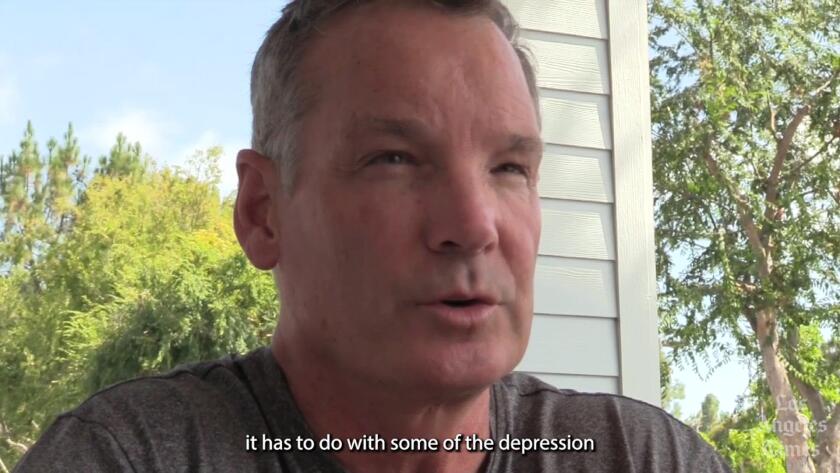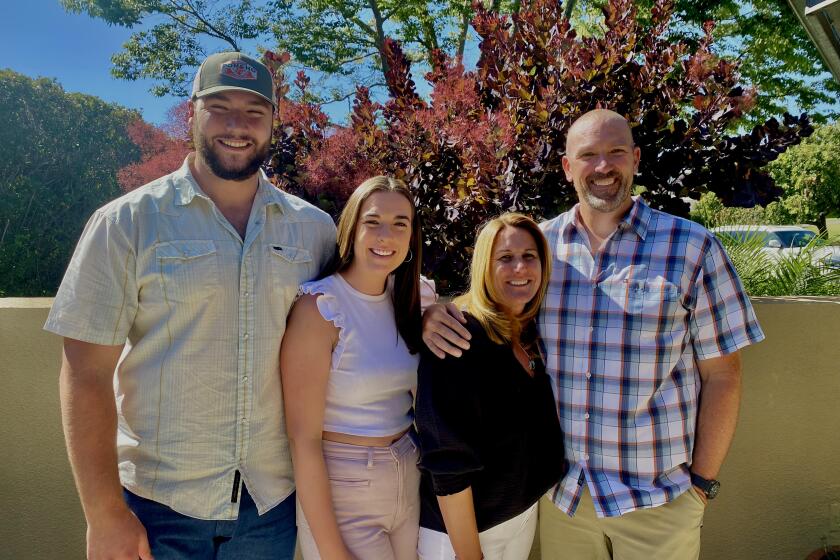Before he tried to kill himself, Erik Kramer saved a kid battling his own darkness
- Share via
Former NFL quarterback Erik Kramer talks about his battles with depression and his new book.
- Share via
Heroes can change you forever and go on to crumble out of sight. It’s not often they piece themselves back together and sit down to tell you about it.
Erik Kramer has high-tech plastic in his skull. Teeth realigned through surgery. Bullet fragments lingering from the hazy night he put a gun under his chin in a Calabasas hotel room and pulled the trigger.
“Basically,” Kramer said over breakfast a while back, pointing toward his forehead, “what you see here is not mine.”
Suicide prevention and crisis counseling resources
If you or someone you know is struggling with suicidal thoughts, seek help from a professional and call 9-8-8. The United States’ first nationwide three-digit mental health crisis hotline 988 will connect callers with trained mental health counselors. Text “HOME” to 741741 in the U.S. and Canada to reach the Crisis Text Line.
What kind of hero is that?
Well, you wouldn’t be reading this if, many years earlier, the emerging college quarterback who later starred for the Detroit Lions and Chicago Bears had not saved a 12-year-old suffering from paralyzing anxiety and depression who didn’t understand it at the time.
Yep, that’s me.
Back then, middle school sucked the little joy there was out of life. Mondays were the worst, Tuesdays and Wednesdays not much better. Saturdays were the payoff, a chance to see Kramer fearlessly lead my hometown North Carolina State Wolfpack to the Peach Bowl in 1986.
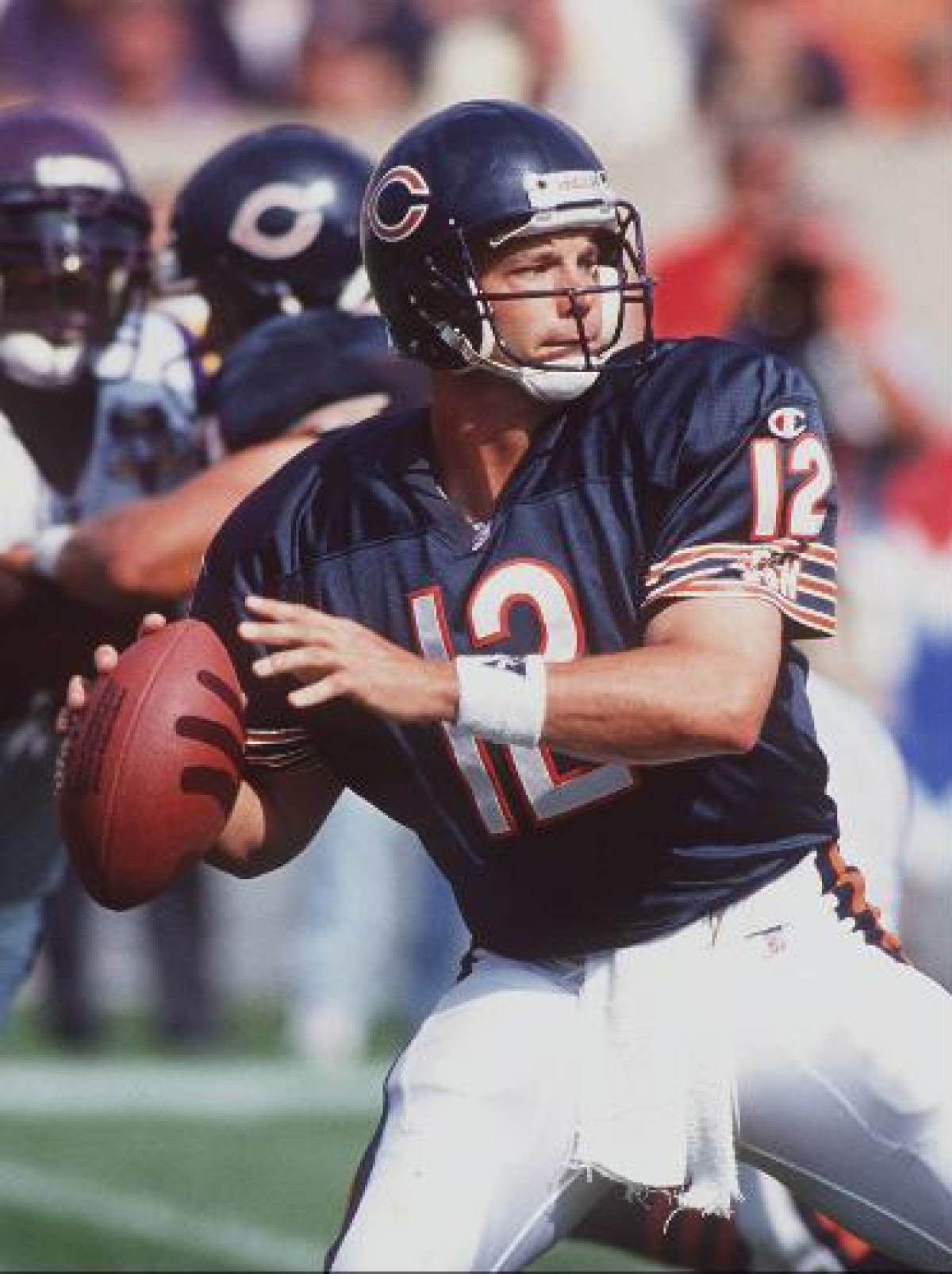
Sports were my savior, and Kramer’s weekly feats sent me scurrying back to the IBM Selectric III typewriter in my mother’s home office to bang out another rambling story about college football that nobody would read.
A series of newspaper jobs would follow, just as Kramer rose through the NFL. We would overlap again, Kramer setting franchise records for the Bears in 1995 while the kid he inspired was finishing journalism school at nearby Northwestern University.
Along the way, Kramer carried a secret burden, crushing depression that worsened amid a string of personal losses after retirement. In his recently released book, “The Ultimate Comeback,” Kramer detailed the events leading him to that Calabasas hotel room in 2015.
His fight for survival came against the fiercest opponent, his own demons provoking a Kramer vs. Kramer showdown that seemed unwinnable.
But just as he had shown that wide-eyed kid so many years earlier, Erik Kramer never could be counted out.
“Fortunately,” Kramer said, “it was probably my most successful failure.”
We sat down at a cafe in Thousand Oaks before the start of football season, discussing a personal comeback and the decades-old revival of a college football program over an omelet and a tuna melt.
Kramer had contacted me a few weeks earlier to see if there was interest in writing about his book and a series of projects in the works to teach quarterbacks and help children sidestep depression.
Uh, yeah.
As we spoke on the phone, he laughed hearing me recount in detail my favorite moments from N.C. State’s storybook 1986 season. The comeback from a 24-7 halftime deficit against Wake Forest. The breakthrough road victory over nationally ranked Maryland. The thrilling 35-34 triumph over rival North Carolina that momentarily left me in tears when a Tar Heel ran into the end zone on a late two-point conversion, only to realize his knee had been down beforehand.
Sitting across from Kramer made me feel more like a 12-year-old fan than a 49-year-old sportswriter. Interviewing LeBron James, Kobe Bryant and countless other sports luminaries in nearly a quarter century at the Los Angeles Times was nowhere near as unnerving as talking to the person who changed the trajectory of my life.
Kramer arrived in my hometown of Raleigh, N.C., as an unlikely hero.
A native of Canoga Park, Kramer had sparingly played quarterback in high school while moving from Van Nuys Valley Christian to Panorama City St. Genevieve to Burbank Burroughs as his father sought the best fit to boost his son’s professional prospects. As a senior at Burroughs, Kramer mostly played free safety, earning all-league second-team honors.
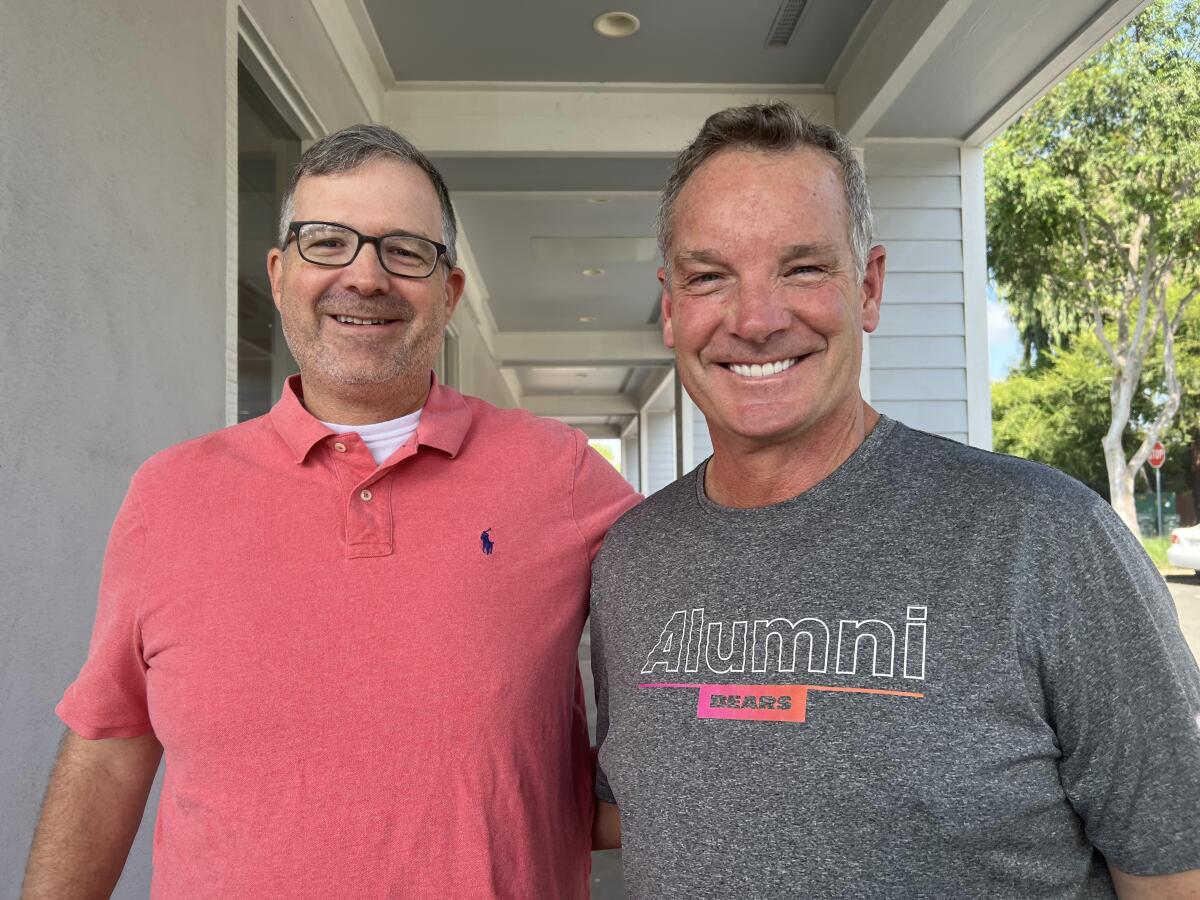
He enrolled at Pierce College in Woodland Hills, beaten out for the starting quarterback job his first season. The next season he won the job and led his team to the Potato Bowl for the junior college national championship, losing to Taft College. A series of major college scholarship offers followed.
Visiting with Kramer after the season, N.C. State’s recruiting coordinator promised he would love the weather in Raleigh because it was just like Southern California.
When Kramer disembarked from the plane on his recruiting visit, clad in a T-shirt and shorts, it was about 10 degrees outside.
“I’m like, ‘Where is this?’ ” Kramer wondered.
It was his new home.
In his second season with the Wolfpack, Kramer led the team to a 6-1-1 start that included my favorite football play of all time.
UCLA football player Thomas Cole and his family explain how his mental health struggles escalated with the hope his story can help others.
In almost half a century of watching sporting events, nothing has left me as breathless as one Kramer pass sailing high into the air inside Carter-Finley Stadium on Nov. 1, 1986. It was the final play of what looked like certain defeat against South Carolina.
In fact, the Gamecocks appeared to have won the game, sacking Kramer as time ran out. But they were offsides, giving the Wolfpack one more chance.
Kramer dropped back, took a few steps toward his right and planted his feet around the 43-yard line before unleashing a Hail Mary. It came down amid a scrum of defenders and Wolfpack wide receiver Danny Peebles, who hauled in the pass for a touchdown.
A wild celebration erupted on the field and in the bleachers where my family sat directly above the end zone, giving us a perfect view of the play. It was hard not to be hooked, Kramer’s heroics sending me back to the IBM Selectric III once again.
My childhood depression felt like a dimmer switch on a slow, steady descent into darkness.
Kramer did not battle the disorder until adulthood, long after outdueling Dallas’ Troy Aikman in 1992 to lead Detroit to its first (and only) playoff victory since 1957.
His first encounter came in 1994, during his first season with the Bears. Sidelined by a separated shoulder while Steve Walsh took his job, Kramer felt as if he were not living up to his three-year, $8.1-million contract. There were days he did not want to get out of bed and make the drive to the practice facility.
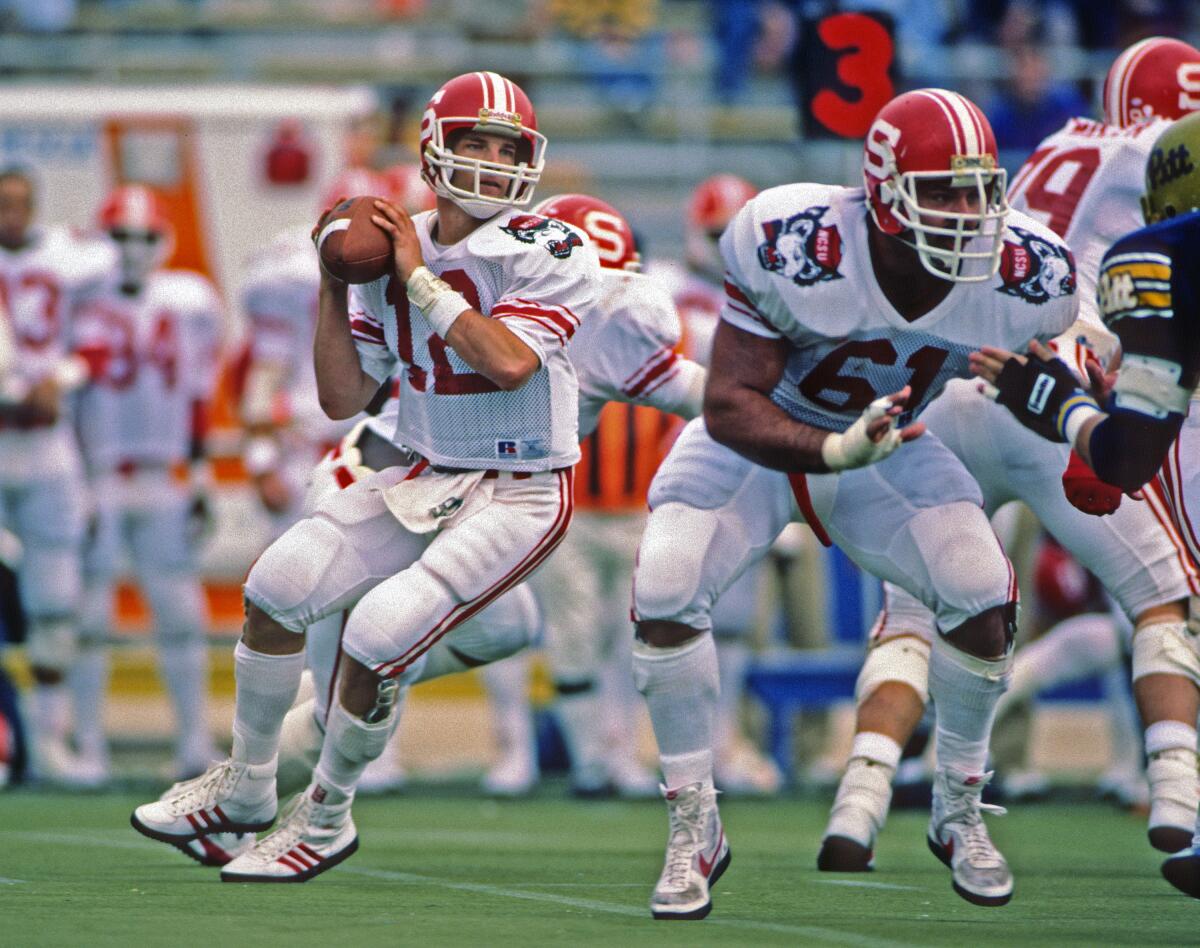
“It was a tough time because the one thing you realize with all that is that your circumstances and your life and whatever is going on doesn’t pause for whatever it is you’re going through,” Kramer said. “So getting back on that train — the train has already left — so you’re kind of trying to make your way onto it or where to sit again and so that took a little doing.”
Counseling, antidepressants and a visit from his mother helped get him back to something that felt close to normal.
But after a record-setting 1995 season, Kramer battled those same doubts. Suffering a couple of herniated disks early in the ‘96 season, he flew home from Detroit with his hand stretched into an overhead bin to lessen the pain that felt like a knife sticking out of his neck.
More injuries would follow, Kramer forced to medically retire while with the San Diego Chargers in 1999.
Having absorbed so many blows to the head, Kramer suspects that the brain disease chronic traumatic encephalopathy, or CTE, might have played a role in his depression. His family won’t know for sure until an autopsy is performed because a diagnosis requires slicing the brain.
The end of his football career was far from his biggest loss.
Kramer knew immediately what it meant when he received a call from the local sheriff’s department one morning in 2011 asking him to come down to the office. A deputy met him outside and let him know that his 18-year-old son, who had been struggling with substance abuse, was dead.
They drove together to see Griffen at a friend’s home. The friend said he wasn’t at fault, that there was nothing he could have done. Erik said he later learned that the friend drove Griffen around after a heroin overdose, calling others and asking what to do as Griffen foamed at the mouth.
Told to take Griffen to a hospital, the friend instead drove him back to his home, dragging Griffen’s limp body to his bedroom before leaving for another party. Griffen died on the floor, alone.
Just as hard as losing his older son was telling his younger son, Dillon, that he would never see his big brother again.
“It was almost like Griffen’s face and body just splintered in a million pieces,” Erik said, “and that sort of happening is just crumbling for everybody.”
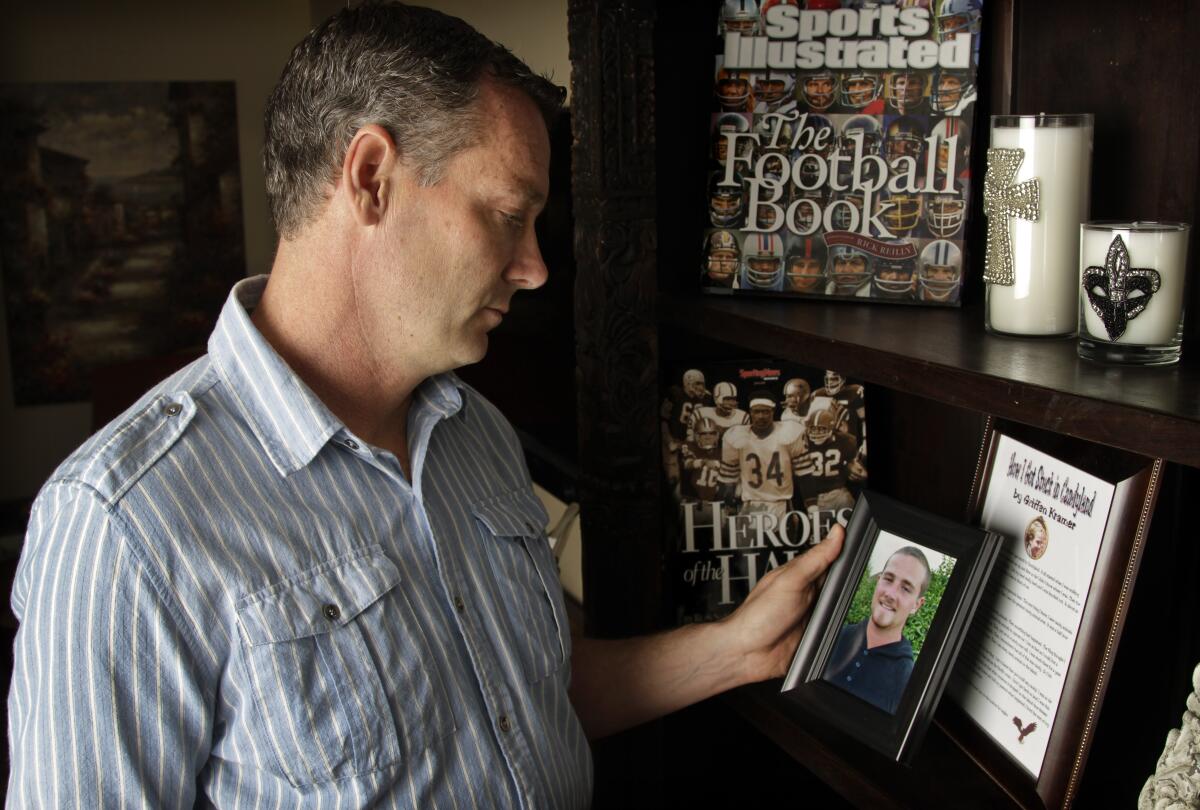
As painful as it was, the death of his oldest son wasn’t rock bottom.
Kramer’s mother, who had helped him through his first bout with depression, died from uterine cancer nine months after Griffen’s death. Around that time, Kramer’s father was diagnosed with terminal esophageal cancer, starting a long, slow decline.
“I couldn’t see any light,” Erik said, “and plotted my own escape.”
Kramer bought a 9mm handgun. He went to a practice range. He wrote suicide notes for family and friends.
Not wanting Dillon to find him amid a grisly scene, Kramer drove to the Good Nite Inn on Agoura Road on Aug. 18, 2015, and checked into a second-floor room.
A text message he had sent to an old high school friend before pulling the trigger might have saved his life. The friend worked for the Los Angeles County Sheriff’s Department, alerting deputies and paramedics to respond to the emergency. He also got Kramer on the phone, telling him to drop whatever was in his hand.
“He heard something hit the floor and I was doing my best gurgling or whatever,” Kramer said, having been told a sequence of events he doesn’t remember, “and I guess he said, ‘Hey, there’s someone at the door for you’ and I guess I went up and went to the door and walked down and got in the ambulance. Crazy.”
Kramer has joked that he’s only alive because, even at close range, he’s such a bad shot. The bullet traveled through his chin and tongue, plunging into his nasal cavity before exiting through the top of his head.
A series of reconstructive surgeries and extensive rehabilitation followed. Kramer’s mental capacity initially was reduced to that of a 6-year-old, and he had impulse control problems.
One issue no longer plagued him. The depression was gone.
Kramer has said that, as crazy as it sounds, he shot the sickness out of himself. A more likely explanation is that he plunged himself back into endeavors he enjoyed such as the creation of an after-school program to help kids beat depression and a video series to mentor quarterbacks.
“I think re-finding a sense of purpose and things to throw yourself into just kind of gets you in the loop of life and that’s what it’s done for me,” said Kramer, now 59. “I’m very kind of happy in all ways and have been for a quite a while.”
His book, co-written with William Croyle, provides tips for dealing with depression. One suggestion is identifying what Kramer calls a “home team” of family and friends who can look out for your well-being and notice things in you that you might not see in yourself.
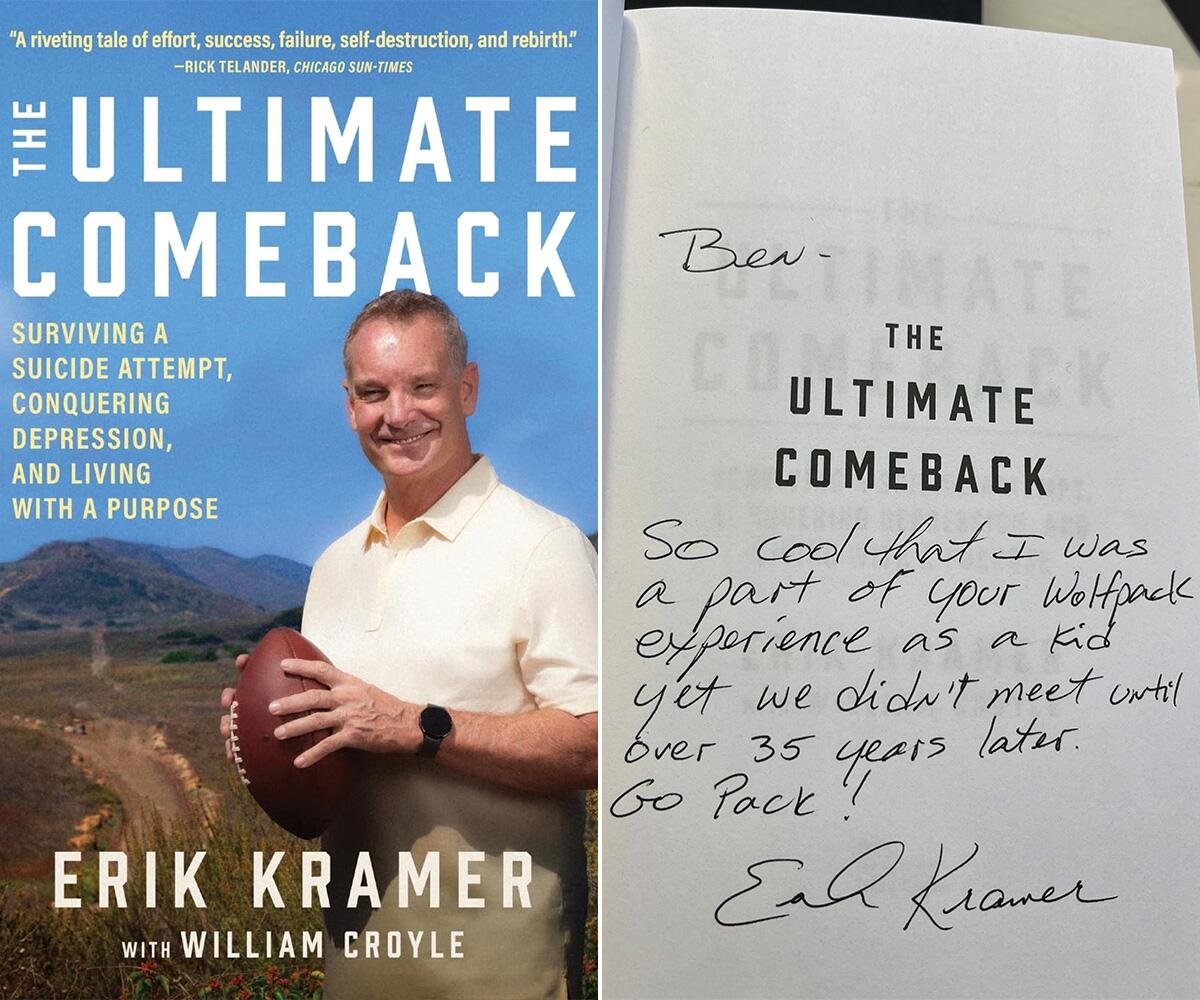
“When you are depressed,” Kramer said, “there is no worse perspective on life than your own.”
Kramer’s home team included Anna Dergan, an old high school friend who helped him navigate through his recovery, as well as an aunt and uncle who live in Granada Hills.
Also rooting him on is a certain sportswriter who covers UCLA based in West Los Angeles. There may be no cheering in the press box, but the 12-year-old in me always will pull for No. 12.
Thank you, Erik Kramer. For then and now.
If you or someone you know is struggling with suicidal thoughts, seek help from a professional and call 9-8-8. The United States’ first nationwide three-digit mental health crisis hotline 988 will connect callers with trained mental health counselors. Text “HOME” to 741741 in the U.S. and Canada to reach the Crisis Text Line.
More to Read
Go beyond the scoreboard
Get the latest on L.A.'s teams in the daily Sports Report newsletter.
You may occasionally receive promotional content from the Los Angeles Times.
